|
December 1, 2020 - No. 81
Alberta Bill 47, the Ensuring Safety and
Red Tape Reduction Act 2020
No to Legalizing the Denial of
Workers' Rights! 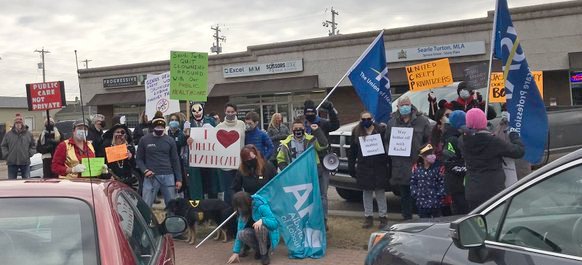
November 3, 2020. Spruce Grove picket against UPC cuts (Epyke)
• Changes to the Workers' Compensation Act
• Nova Scotia Federation of Labour Condemns Bill 47
Demand for Urgent Action in Alberta to Curb COVID-19
• Alberta Federation of Labour Resolution
Quebec Health Workers Oppose Ministerial Decrees
• The Profound, Objective Need for New Arrangements
- Pierre Soublière
Alberta Bill 47, the Ensuring Safety and Red Tape Reduction Act 2020

"Reducing red tape" and "defending workers' rights" have been the
mantra of the neo-liberal forces since the early nineties when they
started restructuring state arrangements to step up schemes to pay the
rich. The neo-liberal arrangements have been systematically smashing
arrangements established in the 20th century which, to a limited
extent, recognized workers' collective rights in exchange for labour
peace. Any collective right is seen as interfering with the interests
of big business to do what they please when they please and now that
private interests are directly controlling the state power, they rule
with impunity. Everyone knows it and working people en masse
categorically condemn the arrogance of a government such as the United
Conservative Party (UCP) government which does it because it can. How
to hold governments to account for their actions has, indeed, become
the matter of greatest concern.
The changes the government of Alberta is making to the Workers' Compensation Act in
Bill 47 are based on the outlook that workers are disposable, and that
"business decisions," not the rights of workers, should prevail. The
sole aim is to reduce employer premiums and obligations through denying
claims, reducing compensation,
introducing arbitrary measures to terminate benefits, and making it
harder for workers to make claims and appeal unjust decisions.
The government does not even try to hide the fact that the Workers'
Compensation Board Board of Governors (WCB - BoG) is a rubber stamp
and that it uses dictate to control all "independent" boards and
agencies and does so quite openly. The fact sheet issued by the
government states that Bill 47 will cut benefits to injured workers by
about $112 million a year plus a further $240 million through
reductions in cost of living adjustment (COLA). The estimated cuts
include "savings" from decisions which are the responsibility of the
WCB BoG which is said to represent the interests of "workers,
employers and the public."
Employer premiums reflect the rate and severity of workplace
accidents, and also the degree to which injured workers receive the
compensation that is their right in return for an agreement whereby
they will not sue their employer. It is the responsibility of any
government worthy of the name to uphold the rights of workers to
healthy and safe
workplaces, and to hold employers accountable. Safe workplaces require
the active participation of the workers in decision-making in all
aspects of their health and safety in the workplace. But the government
is blocking workers from participating in decision-making, depriving
workers of compensation when they are injured, and providing
employers with premium reductions as one of its pay-the-rich schemes.
This attack comes at a time when 28,000 workers across Canada have
filed WCB claims after getting COVID-19 at work, a number which likely
represents only a small fraction of those infected. Furthermore,
workers are actively fighting to control the COVID-19 pandemic by
demanding safety conditions at their places of work which will
control the spread of the disease and protect their own working
conditions. To legislate their working conditions based on the most
anti-human criteria and refuse to compensate them when they are
exhausted or injured or have their family lives turned upside is a
totally anti-democratic measure. It is unacceptable to humankind in the
21st century.
It shows that the main problem facing the workers' movement in Alberta,
as is the case across the country, is what to do when a government such
as the UCP government denies what belongs to them by right. Doing so in
the midst of the pandemic is all the more heinous. It will seriously
aggravate the conditions of impoverishment and suffering
into which they have been thrown, increasing the heavy burden of the
anti-social offensive on everyone's back.
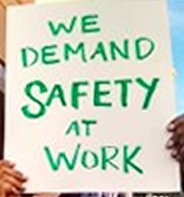 Prior to introducing Bill 47, the UCP government carried out a phony consultation from July 9 to August 14.[1]
The report of the consultation was issued on November 5, the same day
that Bill 47 was given first reading in the legislature. The report
stated, "Government priorities and input from red
tape reduction submissions and workers' compensation system agencies
informed a written submission guide." Notably absent is any mention of
the right to compensation, or the principles upon which the workers
compensation system is based. Prior to introducing Bill 47, the UCP government carried out a phony consultation from July 9 to August 14.[1]
The report of the consultation was issued on November 5, the same day
that Bill 47 was given first reading in the legislature. The report
stated, "Government priorities and input from red
tape reduction submissions and workers' compensation system agencies
informed a written submission guide." Notably absent is any mention of
the right to compensation, or the principles upon which the workers
compensation system is based.
The report states that 85 responses were received,
including 32 from "invited stakeholders" who were mainly employers, 49
from "other interested Albertans," reported as overwhelmingly
representing employers, and four submissions expressing support for
another submission. This contrasts with the broad participation in the
WCB Review
Panel which began in 2016 and issued its report in 2017, acknowledging
the "culture of denial" at WCB and the need for substantive change.[2]
The report states that "Stakeholders were most interested in four
topics: the maximum insurable earnings cap, the employer obligation to
reinstate, presumptive coverage for psychological injuries, and
accident fund surpluses", and notes the responses of employers and
workers. On each of these four topics, Bill 47 carries out the demands
of
employers, as well as on other demands.[3]
This issue of Workers' Forum reports on Bill 47. Workers' Forum congratulates
the Alberta working class for resolutely defending the rights of all in
the battles it is waging. Their fights reveal above all else that when
the aim of defending the rights of all is taken up, the ways and means
can and will be found to fulfil that aim. Notes 1. See "Alberta Government Intensifies Attacks on Workers' Rights: Join Mobilizations
Which
Defend the Rights of All!" and "Fraudulent Review of Workers' Compensation," Workers' Forum, August 20, 2020.
2. See "Justice for Injured Workers:
Compensation Is a Right! and Response to Alberta Workers' Compensation
Board Review Panel Recommendations," Workers' Forum, October 19, 2017.
3. See "Alberta Government, Workers' Compensation Board (WCB) Review, What We Heard," 2017.

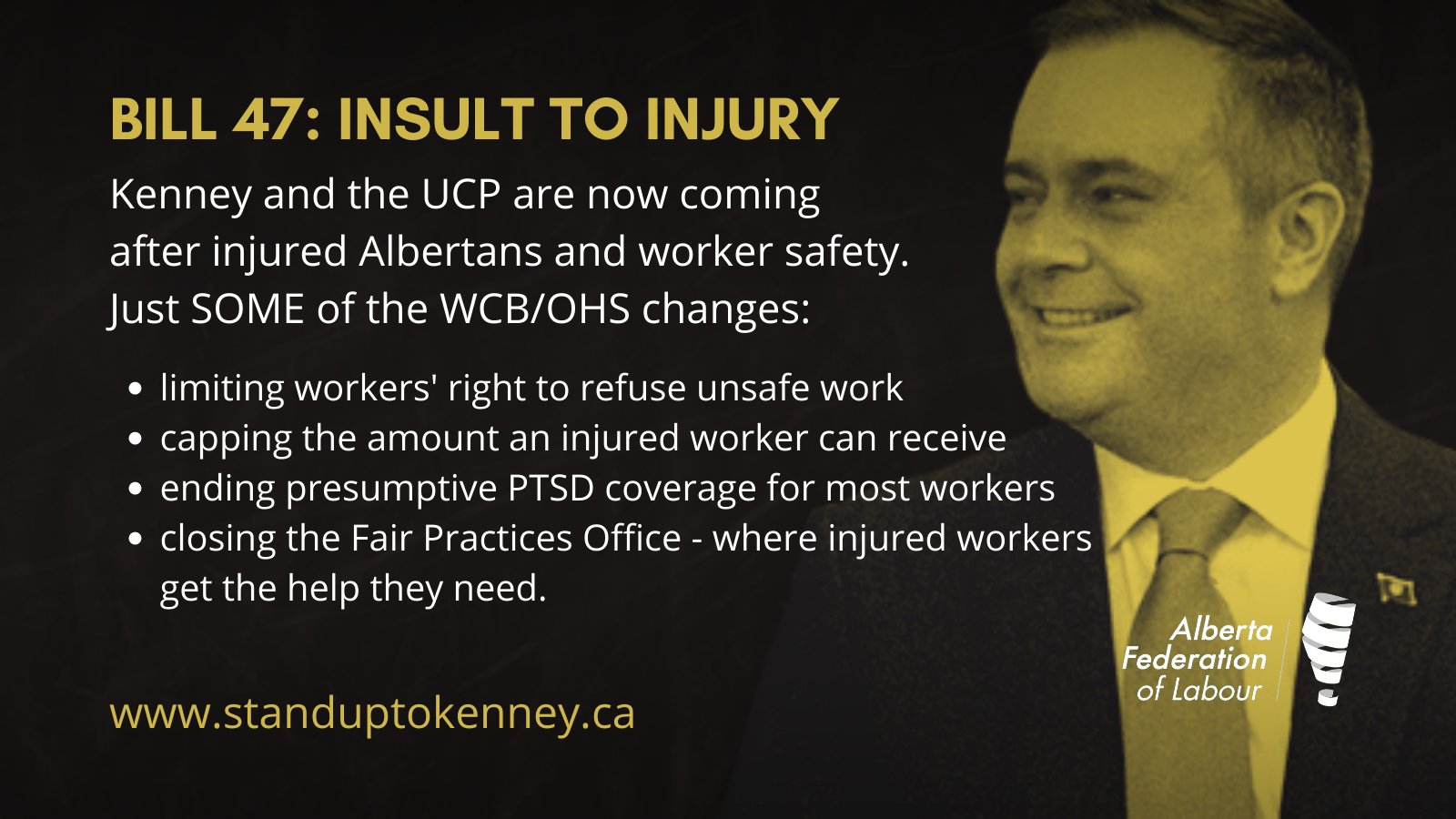 Benefit CutsThe
Workers' Compensation Board (WCB) can establish an earnings cap above
which the WCB would not pay
benefits. It can decide the level of compensation (now and historically
90 per cent of earnings), and the amount of the cost of living
allowance (COLA),
if any. COLA is now set at the Alberta inflation rate. The government's
fact sheet
estimates these changes will reduce payments to workers by about $112
million a year plus plus depriving workers of about $240 millions
through COLA reductions. The WCB Board of Governors (BoG), which
is said to
represent workers, employers and the public, is responsible for setting
the COLA and level of compensation. The UCP is confident
that the BoG will make whatever changes the government dictates. The
UCP makes no bones about the fact that it is dictating what supposedly
"independent"
boards and authorities can do.
Reduction of COLA will be most harmful to workers with permanent
disabilities, who will be left with declining incomes and increasing
poverty.
Obligation to Reinstate Workers
The Act no longer requires employers to reinstate workers who
are ready to return to work. Workers not reinstated must file a
complaint with the Alberta Human Rights Commission that the employer
has violated the duty to accommodate, a process which can take years.
Continuation of Health Benefits
Employers are no longer required to continue health, dental and
other benefits to workers on WCB. Benefits are part of a worker's
earnings, and this violates the basic principle of WCB. WCB only covers
the cost of health benefits related to the injury, and only for the
injured worker but not their family, who will be left without health
benefits.
Presumptive Coverage for Psychological Injuries
Bill 47 eliminates presumptive coverage for psychological injuries for almost
all workers with the exception of first responders, defined as firefighters,
paramedics, peace officers, police officers, correctional officers and
emergency dispatchers. Not even emergency room nurses and workers in
long-term care and COVID-19 wards will be covered.
Workers other than those designated as first responders would have to
prove that their psychological condition was related to their job.
Since the UCP appointed a new BoG to the WCB, a traumatic
experience at work has been narrowly defined as: "Specific, sudden,
frightening or shocking; and/or an actual or threatened death or
serious injury to oneself or other, or threat to one's physical being."
The UCP estimates that withdrawing presumptive coverage will reduce
claims
by $70 million a year.
Ability to Reduce or Suspend Compensation
The Act introduces a "duty to cooperate" for workers.
Compensation can be suspended or reduced if workers fail to cooperate
and or be available for vocational or rehabilitation programs.
Cooperation and availability are not defined. Workers can also be cut
off if they are fired for "egregious conduct" which is also not
defined. One
can only imagine the arbitrary power this gives both the WCB and
employers to deprive workers of what is theirs by right.
Abolishing the Fair Practices Office and Changes to Appeals
The Fair Practices Office is abolished and the WCB will now review
its own practices for fairness, putting the fox in charge of the
henhouse. Workers are left on their own to figure out how to navigate
the WCB system and get their claim accepted. The minimal assistance
provided to workers for appeals now reverts to the Appeals
Commission. Workers will now have one year to file an appeal, not two.
Benefit of the Doubt
The Act will no longer state that if a difference in medical
opinion exists and the evidence is approximately equal, the decision
will be resolved in favour of the worker.
Limiting Participation and Reviews
The Occupational Disease and Injury Advisory Committee has been
eliminated. This committee included medical experts, and at least one
member nominated by a worker(s) organization. Its purpose is to update
medical knowledge of workplace diseases, include new medical knowledge,
in legislation. Legislative reviews of WCB legislation
are now required only every 10 years.
"Surplus" Funds
The UCP also appears to be instructing the WCB to review the
funding policies around the "surplus" funds in the Accident fund,
likely intended to mandate return of "surpluses" to employers. The WCB
Review Panel recommended ending the practice of distributing "surplus"
money from the Accident Fund to employers, and was
incorporated in the Act in 2018.

The Nova Scotia Federation of Labour issued a statement on November 27 entitled NSFL condemns Alberta legislation which puts profit ahead of worker safety. The full statement is reproduced below:
NSFL President Danny Cavanagh wrote Premier Jason Kenney this week.
When your United Conservative Party (UCP) government recently tabled
Bill 47, the so-called Ensuring Safety and Cutting Red Tape, it was
very clear this new legislation will lead to more workers getting hurt
or killed on the job, and if they do get hurt they will have less
access to the support they'll need as injured workers.
This bill is not about red tape reduction, it is really just another
example of the UCP putting employer profits ahead of workers' health
and safety. This new legislation is another attack on Alberta workers,
which will put them at risk in more unsafe workplaces and mean less
compensation for those workers hurt or killed on the job.
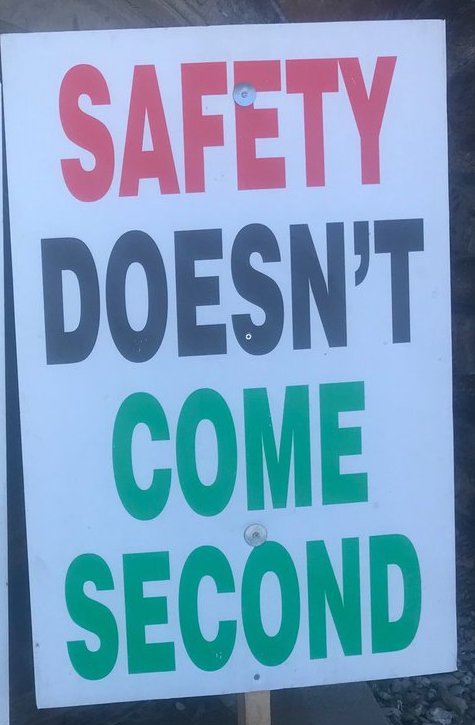 We
are very concerned about amendments to the Workers Compensation Act,
especially the removal of the legal requirement of employers to
reinstate an injured worker and capping the amount an injured worker
can receive, ending presumptive coverage for psychological injuries for
most workers, and closing down the Fair Practices Office;
the only place for most injured workers to receive support with
navigating the system. We
are very concerned about amendments to the Workers Compensation Act,
especially the removal of the legal requirement of employers to
reinstate an injured worker and capping the amount an injured worker
can receive, ending presumptive coverage for psychological injuries for
most workers, and closing down the Fair Practices Office;
the only place for most injured workers to receive support with
navigating the system.
We also do not understand your approach of replacing the current
Occupational Health and Safety Act, instead of simply amending it.
However, it's clear that the most concerning proposed change is the
limiting of a worker's right to refuse unsafe work; which is a crucial
lifesaving right, especially true during the COVID-19 pandemic.
The right to refuse has been crucial for workers to ensure a safe
workplace during the ongoing COVID-19 pandemic. Attacking a worker's
right to refuse unsafe work during the ongoing pandemic is dangerous.
With the tabling of Bill 47, it is clear that you are not on the
side of working Albertans. We urge you to rescind this Bill and get
behind the workers of your province instead of working against them.

Demand for Urgent Action in Alberta to Curb COVID-19
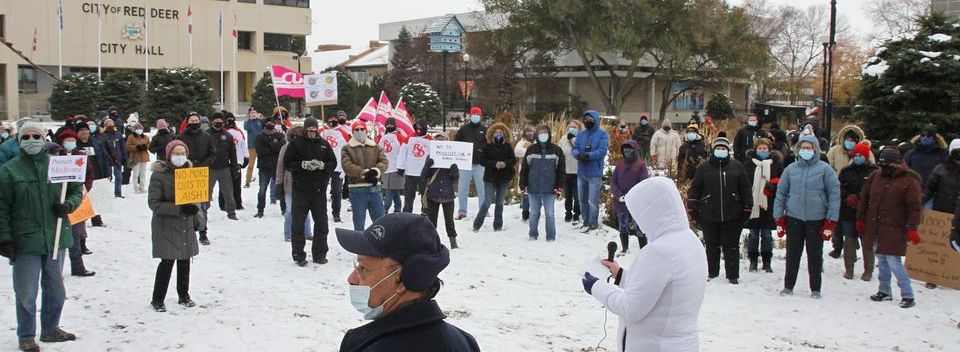 October 23, 2020. Rally in Red Deer to oppose Kenney government cuts
(AUPE) October 23, 2020. Rally in Red Deer to oppose Kenney government cuts
(AUPE)
The Alberta Federation of Labour (AFL) Executive Council
unanimously adopted a resolution on November 19 which sets out a
concrete set of actions needed to stop the spread of COVID-19 and
support Albertans through the second wave of the pandemic, and calls on
the government to implement these measures immediately. The
resolution also demands that the government stop its attacks on doctors
and health care workers, stop its privatization schemes, and stop
actions to undermine the health and safety of Alberta workers.
The resolution calls on the government to immediately:
- Enact a "circuit-breaker" lockdown to break the chains of
transmission and slow the spread of the virus, as recommended by
hundreds of doctors, health care policy experts and Alberta's largest
health care unions.
- Enact a province-wide mask mandate for all indoor public spaces, including all workplaces.
- Re-institute a single-site policy in long-term care facilities
(the policy was never really made functional in the first wave, the AFL
resolution notes).
- Introduce mandatory paid sick leave so people can actually afford to stay home when they're sick or when they need to isolate.
- Provide provincial income and financial support for Albertans who
lose their jobs as a result of a lockdown -- including a
provincially-mandated moratorium on evictions and foreclosures.
- Adopt the federal exposure notification app.
- Dramatically increase funding for schools -- so we can hire more
staff to cover when other staff are isolating and to shrink class sizes
to promote physical distancing.
- Formally recognize the new science on aerosol transmission of COVID-19.
- Invest significant and adequate amounts of provincial money in
proper ventilation in schools, health care facilities and workplaces,
so we can heed the new scientific evidence on aerosol transmission of
COVID-19.
- Update PPE guidance for all workers, especially those in the
health care sector, to accord with the new scientific consensus on the
aerosol transmission of COVID-19.
- Formally embrace the precautionary principle and acknowledge that
it should guide all COVID-19-related health and safety decisions in
Alberta workplaces.
- Release full information about outbreaks in private sector
workplaces (this was promised in April but has never been acted upon
fully, the AFL notes)
- Proactively inspect Alberta workplaces and levy fines on employers
who are putting their workers at risk by not following public health
guidelines.
- Adopt a zero-COVID, "crush and contain" strategy, similar to the
ones adopted by the jurisdictions around the world that have been most
successful at dealing with COVID-19 —- like New Zealand,
Australia and Taiwan (and also the provinces of the "Atlantic Bubble"
here in Canada).
- Develop a provincial vaccination plan so that we can move quickly to
distribute vaccines when they become available and overcome dangerous
misinformation campaigns.
The government must also:
- Stop driving doctors out of the province during a pandemic;
- Stop plans to lay off 11,000 health care workers during a pandemic;
- Stop underfunding our health care and education systems;
- Stop plans to privatize Alberta's public testing and lab
facilities, which continue to be such an important part of our pandemic
response;
- Stop legislation (Bill 47) aimed at stripping Albertans of their
right to refuse dangerous work. This right is always important, but
it's shocking that the government is trying to eliminate it during a
pandemic and when it is abundantly clear that not all employers are
following public health directives, the resolution states.

Quebec Health Workers Oppose Ministerial Decrees
- Pierre Soublière - 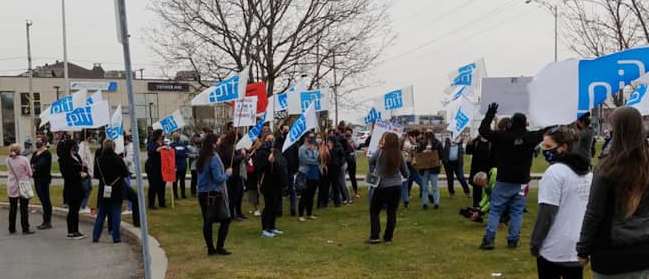
November 6, 2020. Protest at Gatineau Hospital against ministerial decrees.
For the past few weeks in Quebec, in particular in the face
of the second wave of the
pandemic and the refusal of the Quebec government to
mobilize the people to
overcome the problems, the gap between the authority and legitimacy
of the government
and the conditions created by the modern productive forces of a
highly socialized
economy is widening.
In the forefront are the health care workers who are more
and more expressing their discontent and who keep putting forward the solutions which
will allow them to ensure their own protection and security as well as
that of patients and residents in their care. The inescapable priority,
that of improving working conditions, is being heard far and
wide. These improvements are not vague ideas but are put forward as
very precise, concrete measures in terms of staff/patient ratio, stable
work schedules, etc. Along with these measures, there is a growing
general preoccupation with regards to the fate of our elders, and one
of the questions which arises is why it is left up to private
interests,
whose sole motive is profit, to care for our loved ones. There is also
a consensus to the effect that the capacity of the health system to
curb the coronavirus has been undermined by decades of cutbacks,
contracting out, privatization and anti-social reforms which have
rendered the health care system more and more inaccessible, and
certainly not
sound enough to overcome crises such as the present pandemic.
 Faced
with these proposals from the workers but also from various sectors of
the population, the response of the Legault government, besides its
usual initial show of supposed "empathy," is to continue with business
as usual, following its own agenda by imposing ministerial decrees and
issuing threats. These ministerial decrees in health care
have made the situation worse, as they have allowed employers to
continue worsening employees' working conditions, with dangerous
consequences for the latter as well as for the people in their care. In
certain homes for the elderly, where there have been new outbreaks with
the second wave, one employer stated that one of the measures it had
taken was to hire security guards to make rounds to make sure everyone
is "respecting the directives!" Faced
with these proposals from the workers but also from various sectors of
the population, the response of the Legault government, besides its
usual initial show of supposed "empathy," is to continue with business
as usual, following its own agenda by imposing ministerial decrees and
issuing threats. These ministerial decrees in health care
have made the situation worse, as they have allowed employers to
continue worsening employees' working conditions, with dangerous
consequences for the latter as well as for the people in their care. In
certain homes for the elderly, where there have been new outbreaks with
the second wave, one employer stated that one of the measures it had
taken was to hire security guards to make rounds to make sure everyone
is "respecting the directives!"
When the Quebec government announced it would once again close gyms,
restaurants and cinemas, a number of owners raised that when they had
reopened in the wake of the first wave, they had complied with the
guidelines of public health authorities, and that to close once again
would surely lead them to bankruptcy. The Legault
government, which, along with its predecessors, always claim to be the
greatest allies of small and medium-sized enterprises, refused to
listen. One association representing over 200 gyms in Quebec waged a
campaign to explain how their services actually contribute to the
physical and mental well-being of the population, and how, with the
proper
measures taken, gyms have not been a source of outbreaks. When the
spokespersons suggested that they would perhaps defy government orders
and stay open, the Legault government threatened to impose stiff fines
on whoever would show up at these gyms.
An association of 700 doctors, called the Quebec Coalition for the
Decentralization of the Health System, has stated that it was held back
by local administrations in their efforts to "adopt concrete measures
and solutions to curb the pandemic in healthcare institutions." It
raises that autonomy of personnel on the ground is even more essential
during this second wave, as the system must treat not only patients
with COVID-19 but also those suffering from cancer or heart attacks,
and this in the midst of serious staff shortages. The first attempts
of the association to speak with the government were in June, and the
Legault government continues to rebuff its attempts to meet.
Also, recently, in an open letter concerning the fact that Gatineau
has been declared a "red zone," the Mayor of Gatineau made the
following point: "It is clear that uniquely from the public health
perspective, we should be in an orange zone, even light orange... Why
is this? It is the weakness of our health system, which is another
criterion to
determine zone colours, and of which little is said. The directors of
public health in the Outaouais and across Quebec make this very clear:
were it not for the frailty of the health system in the Outaouais, the
low number of available beds, nurses and doctors, we would be in an
orange zone. We are, again today, victims of decades of negligence in
terms of investing in health." The mayor goes on to say that were it
not for this injustice, "we could break the isolation which weighs
heavily upon us, our elderly would suffer less, and we would lose fewer
jobs, since, for the most part, job losses are in the sectors which
would still be open were we an orange zone."
Society is crying out for new arrangements whereby all sections of
the people, starting with the workers, are called upon to play their
part to overcome the problems at hand, the present one as well as all
the others. New forms are necessary to find solutions to social
problems, in consideration of individual and collective interests and
those of
society as a whole, in a democratic movement. Attempts to criminalize
the demands, views and proposals of the people and their organizations
is part of the problem and constitutes a major hindrance to the
democratic advancement of society.

(To access articles individually click on the black headline.)
PDF
PREVIOUS
ISSUES | HOME
Website: www.cpcml.ca
Email: office@cpcml.ca
|

